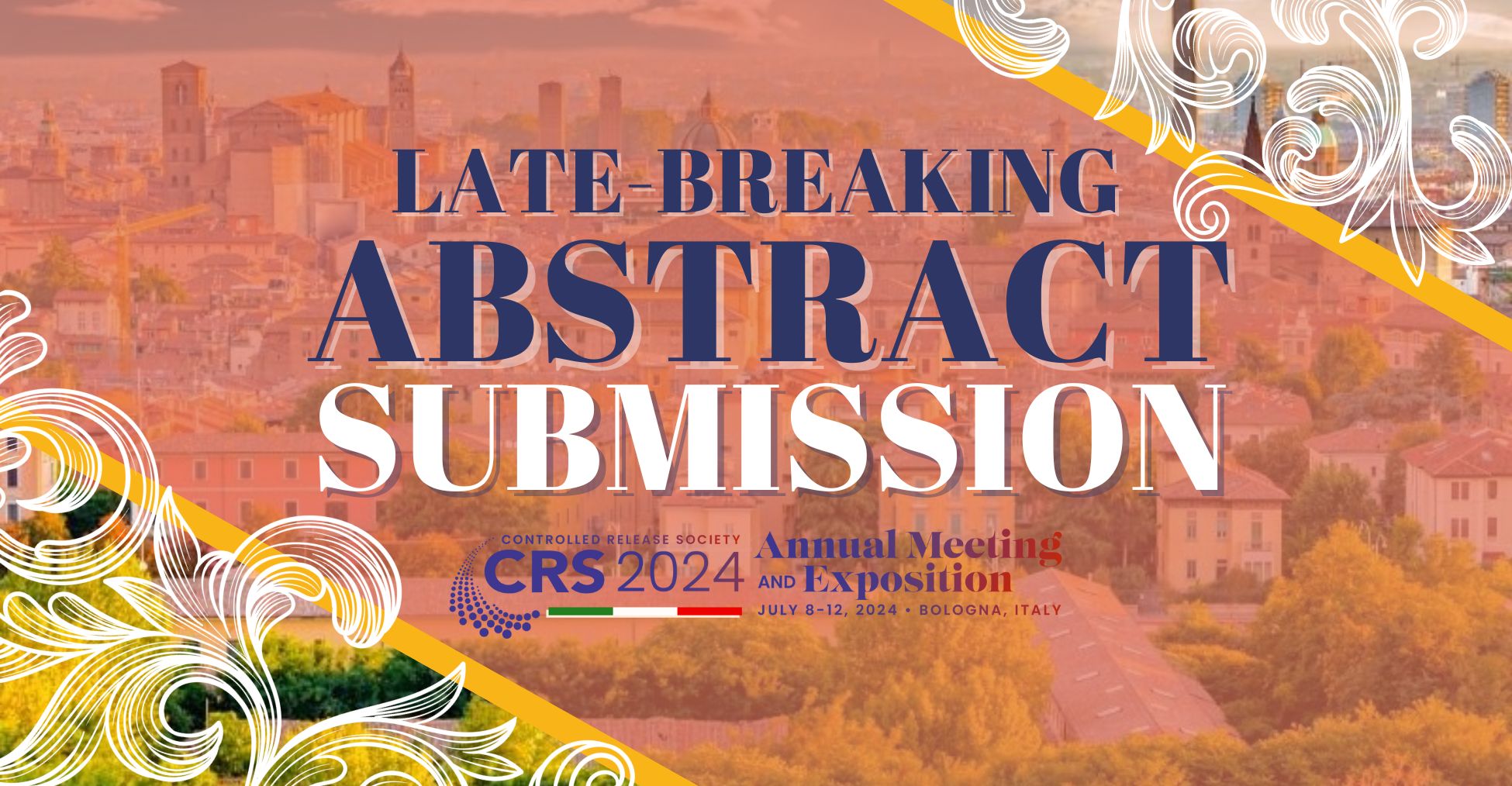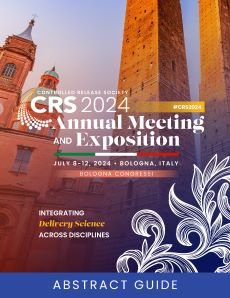
*Late-Breaking Abstract Submission is CLOSED*
The CRS 2024 Annual Meeting and Exposition offers an exceptional opportunity to share your research with an international audience of experts in the design, development, and implementation of novel delivery technologies.
All abstracts submitted for the CRS 2024 Annual Meeting & Exposition will go through a rigorous review procedure to maintain the highest scientific quality of the meeting. All abstracts will be evaluated by the CRS Annual Meeting Program Committee and will be assigned a rank order based on their scientific content.
Session Topics and Descriptions for Abstracts
- Nanomedicine and Nanoscale Delivery (Focus Group - NND): Development, physicochemical and biological characterization and validation of nanomedicines and biomedical nanotechnology-based approaches tailored to deliver therapeutic agents with distinct properties, such as small molecules, peptides, proteins, antibodies across biological barriers specifically targeting disease-associated molecules, cells, tissues or organs.
- Immuno Delivery (Focus Group - ID): New approaches in drug delivery for targeting immune cells residing in peripheral tissues, diseased tissues, and at the primary sites of immunological reactions; modification of the innate and adaptive immune responses; immunomodulation of the tumor microenvironment, immunotherapy.
- Oral delivery (Focus Group - OrD): Formulation and technologies for effective delivery and controlled release of small molecules and/or biologic drugs to maximize their oral bioavailability and targeted delivery; oral delivery of nutraceuticals and other food additives; use of food and beverages as delivery vehicles.
- Skin and Mucosal Delivery (Focus Group - SMD): Delivery of therapeutics and diagnostic agents through the skin or mucous membranes, such as in the gastrointestinal tract, respiratory tract, or other tissues with mucosal lining; novel strategies to overcome challenges in topical, subcutaneous, transdermal, intradermal, intramuscular, and mucosal delivery.
- Ocular delivery (Focus Group - OcD): Challenges and opportunities unique to the treatment of vision-threatening diseases (e.g., dry eye disease, cystinosis, posterior capsule opacification, retinal degenerative diseases, glaucoma, optic neuropathy, ocular injuries, etc); design of advanced drug delivery systems, extended release formulations, and drug-device combinations for ophthalmic applications, such as eye drops, contact lenses, punctal plugs, injectables, intravitreal devices, suprachoroidal delivery, ultrasound mediated delivery; overcoming physiological barriers in ocular drug delivery (e.g., corneal epithelial barrier, blood-retinal-barrier, aqueous humor turnover, etc).
- Bioengineering (Focus Group – Bioengineering): Bioinspired and biomimetic strategies for the design of (advanced) drug delivery systems and drug-device combinations (e.g., cell-mimicking carriers, synthetic extracellular vesicles, etc); bioinspired methods that involve construction of biological building blocks or leveraging bio-interactions to create various delivery formulations; mimicking the physicochemical and physiological properties of natural particulates, ranging from pathogens to mammalian cells, to facilitate controlled release of therapeutics.
- Gene Delivery and Gene Editing (Focus Group - GDGE): Delivery of nucleic acids such as mRNA, pDNA, oligonucleotides (siRNA, ASOs) using delivery platforms such as lipid nanoparticles, polymeric nanoparticles, liposomes, inorganic nanoparticles, virus-like particles, conjugates, exosomes and biomimetic particles for expression of therapeutic proteins, modulation of protein expression, genome editing for disease modification, and vaccination. Advances in particle characterization, biological limitations of systems (endosomal escape, cellular targeting, tissue targeting / biodistribution) to advance the field of nucleic acid delivery fall within scope of this focus group.
- Alternative Methods to Animal Testing: Design and demonstration of microfluidic devices (organs-on-chips) and three-dimensional cell assemblies (organoids) recreating in-vitro the biological complexity of both diseased and healthy tissues; and 3D bioprinting techniques; use of alternative organisms (zebrafish, c. elegans, etc.); in vitro/in silico assays to characterize the efficacy, specificity, and toxicological profiles of various therapeutic agents.
- Long-Acting Drug Delivery Formulations: Engineering, testing, and validation of microparticles and implants/devices for the controlled release of various therapeutic agents over extended periods of time (weeks to months and years); preformed and in-situ formed biodegradable implants; new methods for biodegradation and biocompatibility characterizations; not-biodegradable implants.
- Delivery to the Nervous System: Design and testing of delivery systems capable to deliver various therapeutic agents to the nervous system, both central and peripheral; novel approaches to cross the blood-brain barrier (BBB) and the blood-nerve barrier (BNB); nanoparticles and delivery systems for intrathecal, intracranial, intracerebroventricular and nasal administration; focused ultrasound.
- 2024 CRS/ESMI Joint Session: Imaging in drug delivery: imaging of drug delivery for monitoring disease progression, biodistribution, nanoparticle kinetics, etc; image-guided drug delivery (TACE, SIRT, HIFU, etc.); theranostics; companion diagnostics; and nanomedicine-based patient stratification.
- Artificial Intelligence and Predictive Models in Pharmaceutical technologies: Convergence of drug delivery with artificial intelligence, machine learning, and mathematical modeling (PK / PD modeling, compartment modeling); development of AI/ML tools for materials selection and optimization of the pharmacological and biological performance of nanomedicines and delivery systems; modeling of biophysical processes (cell uptake, mass transport, biodistribution, biodegradation etc.) to optimize the performance of drug delivery systems.
- Delivery Technologies for Diversified Products: Developments in the design and manufacturing of controlled release solutions in personal and home care areas (cosmetics, cosmeceuticals, skin care, deodorants, antiperspirants, hair care, mouth care, air fresheners, and cleaning and sanitizing agents); household products; industrial applications (paints, coatings, green energy applications, batteries, etc.); textiles; drug delivery systems for space applications; and any other controlled release applications not covered by the other categories.
- Delivery Technologies for Sustainable Agriculture, Aquaculture, and Farming: Development and implementation of delivery technologies aimed at promoting sustainability in agriculture, aquaculture, and farming practices; technologies for improving feeding practices, disease monitoring, and the final quality.”
- Manufacturing and Process Scale-Up: Evaluation and characterization of delivery products, preparation and scale up, Quality-by-design (QbD) concepts, analytical technologies, additive manufacturing, 3D-printing, innovative green technologies (e.g., use of natural, non-modified, renewable materials), regulatory science, CMC, QC.
- Global health and Special Populations: Development of delivery strategies and novel nanoformulations to address global diseases or diseases affecting developing countries; use of delivery systems to improve therapeutic interventions in gender/race-related health with a specific emphasis on vulnerable pediatric and geriatric patients, minorities; understanding how gender affects dosage, route of administration, pharmacokinetics/dynamics; gender-specific patient compliance.
- Women’s Health for Everyone’s Health: Drug delivery approaches including, 3D printing, microneedle arrays, nanomedicine, hydrogels, films, implants, and injectables for Women’s specific applications such as hormonal therapies, infectious diseases, contraception, and maternal and fetal health. Research encompassing fundamental or translational aspects of drug delivery technologies for women's health.
Countdown to Bologna, Italy!
July 8 to 12, 2024
Bologna Congressi
Bologna, Italy


